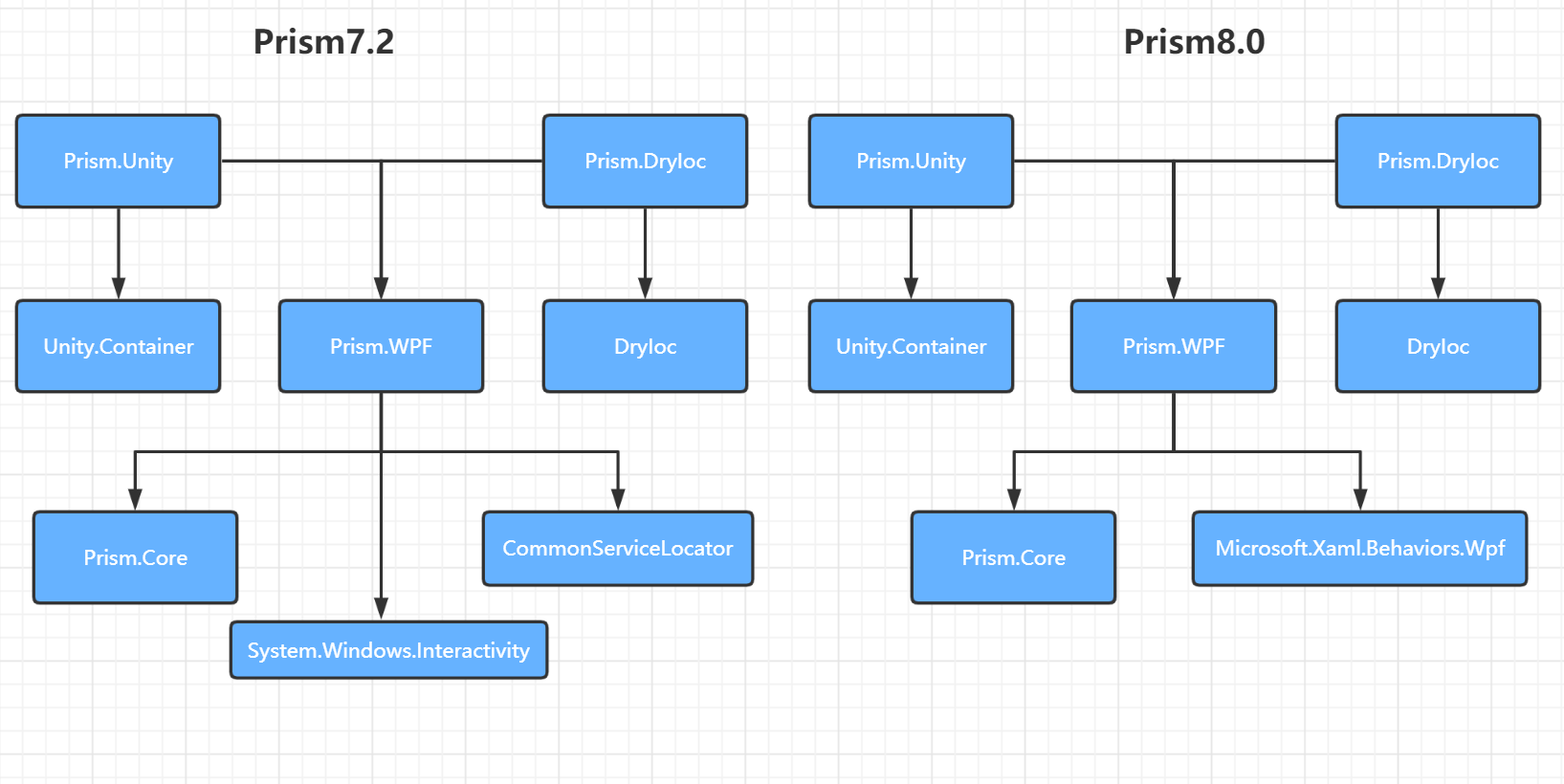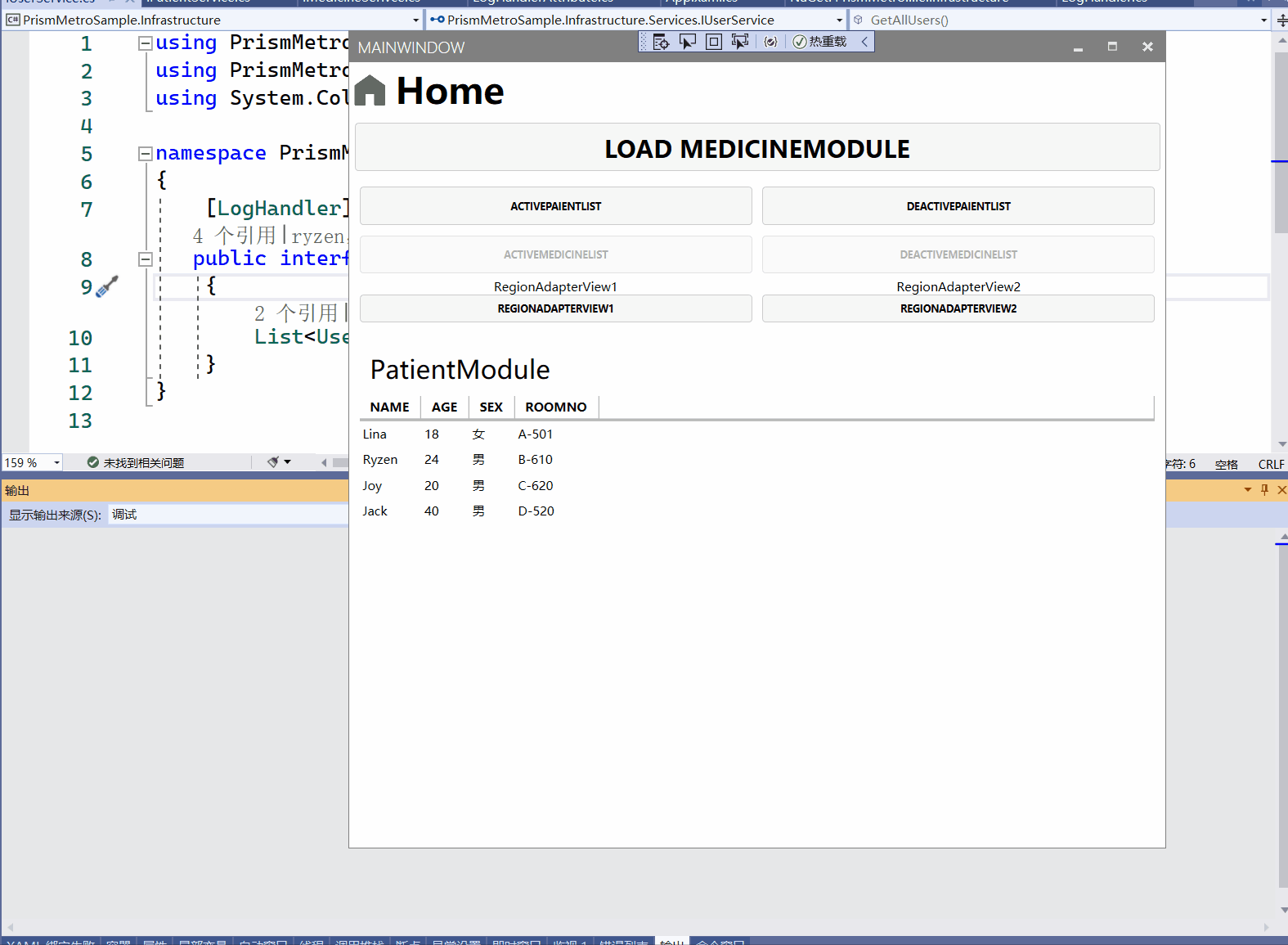WPF NET5 Prism8.0的升级指南
前言
曾经我以学习的目的写了关于在.NET Core3.1使用Prism的系列文章.NET Core 3 WPF MVVM框架 Prism系列文章索引,也谢谢大家的支持,事实上当初的版本则是Prism7.2.0.1442(7.2)版本,而现在也发布了.NET5和最新的Prism8.0.0.1909(8.0)版本,因此同样的我想将之前的Prism Demo项目可以升级到最新,写这篇文章的目的是自己也能学习一番,而更多的是回答那些在我Prism系列文章下面留下的我认为可以拿来一讲一些问题,而有些问题我则是水平有限回答不了(真的不是不想回答)
然后我拿之前的Prism Demo项目,WPF从.NET Core3.1升级到.NET 5其实非常简单,无脑修改项目的TargetFramework为net5.0-windows就行了,但是当Prism7.2升级到Prism8.0,我发现build的时候报了很多错误,那么让我们来看看究竟Prism8.0更新了些啥
一 .Prism8.0更新了什么?
我们先来看下关于Prism7.2和Prism8.0的程序集引用情况,可推敲出一些不同:

这里可能不会讲述所有关于Prism8.0更新的全部细节,只是我认为可能主要的一些功能,我们可以看到Prism8.0相比Prism7.2,在Prism.WPF中去除了System.Windows.Interactivity和CommonServiceLocator程序集,引入了Microsoft.Xaml.Behaviors.Wpf,实际上Prism8.0做了以下整合:
- 用
Microsoft.Xaml.Behaviors.Wpf替换System.Windows.Interactivity CommonServiceLocator整合入Prism.Core之中
因为你从旧版本更新到Prism8.0可能会发生报错,而我的目的则是一篇更新指南,关于Prism8.0更新的全部细节,可以看官方在github的Prism8.0的ReleaseNote,这里还推荐dino.c大佬的有关Prism8.0的文章:[Windows] Prism 8.0 入门(上):Prism.Core和[Windows] Prism 8.0 入门(下):Prism.Wpf 和 Prism.Unity
1.ContainerLocator.Current.Resolve函数去除:
ContainerLocator.Current.Resolve<T>
//替换为
ServiceLocator.Current.GetInstance<T>
这可能是你遇到的第一个升级报错,因为ContainerLocator.Current.Resolve<T>这个api本来是在Prism.WPF下的CommonServiceLocator程序集下面的,8.0时候被砍了,在Prism.Core加上ServiceLocator.Current.GetInstance<T>用于替换,切掉了CommonServiceLocator程序集,我觉得非常合理,因为该功能本身就应该是IOC里面的公共功能
2.有关事件转命令的程序集变化:
xmlns:i="http://schemas.microsoft.com/expression/2010/interactivity"
//替换为
xmlns:i="http://schemas.microsoft.com/xaml/behaviors"
这可能是你遇到的第二个升级报错,由于用Microsoft.Xaml.Behaviors.Wpf替换System.Windows.Interactivity,因此,xaml的xmlns也需要对应更改
3.去除 Bootstrapper :
public partial class App : Bootstrapper
//替换成
public partial class App : PrismApplication //(推荐)其他平台也支持
//or
public partial class App : PrismBootstrapper //WPF独有
这可能是你遇到的第三个升级报错,我们在App.cs中都会继承一个底层类用于注册或者配置,其实在Prism7.2的时候Bootstrapper 已经被标记为弃用状态,而在Prism8.0更是直接删除,推荐继承PrismApplication(各平台都支持),当然也可以选择PrismBootstrapper (WPF独有)
4.IOC添加新注册功能:
其实IOC这部分功能我不打算细讲,因为其实不属于Prism的特性功能,因为Prism默认支持两个IOC扩展,也就是Unity和DryIoc的,而新添加的功能也是对应通过两个IOC支持实现的,直接看代码示例:
public interface ITestService { }
public interface ITest2Service { }
public class TestService : ITestService, ITest2Service { }
private static ITestService TestDelegate() =>new TestService();
//添加支持注册多服务对应单实现类的功能
var services = new[] { typeof(ITestService), typeof(ITest2Service) };
IContainerRegistry.RegisterManySingleton<TestService>(services);//注册成单例模式
IContainerRegistry.RegisterMany<TestService>(services);//注册成瞬时模式
//添加支持注册服务为scope(范围模式)
IContainerRegistry.RegisterScoped(typeof(TestService))//单服务
IContainerRegistry.RegisterScoped(typeof(TestService), typeof(TestService))//单服务
IContainerRegistry.RegisterScoped<TestService>();//单服务泛型版本
IContainerRegistry.RegisterScoped(typeof(ITestService), typeof(TestService))//单服务单实现
//添加支持通过委托方法注册服务
IContainerRegistry.Register(typeof(ITestService), TestDelegate)//注册为瞬时模式
IContainerRegistry.RegisterSingleton(typeof(ITestService), TestDelegate)//注册为单例模式
IContainerRegistry.RegisterScoped(typeof(ITestService), TestDelegate)//注册为范围模式
5.添加了有关在void方法中异步等待Task的扩展方法:
你乍一看好像没什么卵用,但是里面还是有说法的,我们来看一个例子,WPF界面MVVM异步读取耗时数据加载界面,这里是xaml的简化代码::
xmlns:i="http://schemas.microsoft.com/xaml/behaviors"
<i:Interaction.Triggers>
<i:EventTrigger EventName="Loaded">
<i:InvokeCommandAction Command="{Binding LoadCommand}"/>
</i:EventTrigger>
</i:Interaction.Triggers>
<DataGrid Grid.Row="1" IsReadOnly="True" ItemsSource="{Binding AllMedicines}" AutoGenerateColumns="False">
<DataGrid.Columns>
<DataGridTextColumn Header="Name" Binding="{Binding Name}"/>
<DataGridTextColumn Header="Type" Binding="{Binding Type}"/>
<DataGridTextColumn Header="Unit" Binding="{Binding Unit}"/>
</DataGrid.Columns>
</DataGrid>
ViewModel简化代码:
private ObservableCollection<Medicine> _allMedicines=new ObservableCollection<Medicine>();
public ObservableCollection<Medicine> AllMedicines
{
get { return _allMedicines; }
set { _allMedicines = value; }
}
private DelegateCommand _loadCommand;
public DelegateCommand LoadCommand =>
_loadCommand ?? (_loadCommand = new DelegateCommand(ExecuteLoadCommand));
async void ExecuteLoadCommand()
{
await ALongTask();
this.AllMedicines.AddRange(_medicineSerivce.GetAllMedicines());
}
private async Task ALongTask()
{
await Task.Delay(3000);//模拟耗时操作
Debug.WriteLine("耗时操作完成");
}
这是正常我们会实现的方式,同样的也确实不会出现跨线程问题(在非UI线程操作ObservableCollection集合会出现),关于async await在WPF不会出现跨线程问题,可以参考我的另外一篇文章异步函数async await在wpf都做了什么?,也同样的在执行耗时操作时候不会阻塞UI主线程,如果在最上层不用async void能否实现同样的效果,这就是TaskExtension的意义了,下面只例举非泛型版本TaskExtension的api,,实际还有泛型版本的TaskExtension,我们拿最多参数的重载方法来说明:
public static class TaskExtensions
{
public static async void Await(this Task task, Action completedCallback, Action<Exception> errorCallback, bool configureAwait)
{
try
{
await task.ConfigureAwait(configureAwait);
completedCallback?.Invoke();
}
catch (Exception obj)
{
errorCallback?.Invoke(obj);
}
}
}
1.completedCallback:当前Task的回调函数,指Task执行的后续操作
2.errorCallback:回调函数的异常回调函数,回调函数异常后可以执行
3.configureAwait:指示回调函数是否在当前执行上下文执行,True为是,false为否
我们可以把ExecuteLoadCommand方法修改下:
void ExecuteLoadCommand()
{
//TaskExtension for async void Command
ALongTask().Await( completedCallback:() =>
{
this.AllMedicines.AddRange(_medicineSerivce.GetAllMedicines());
}, errorCallback:null,configureAwait:true);
}
该方式执行效果和之前一样,而且不用在void方法加上async 和方法内部await就能实现异步等待操作,而这只是推荐在Command的Excuted Method使用,这也是官方推荐的,因为一般Excuted Method返回值只会是void
二.回答一些问题
如何在Prism使用AOP?
其实AOP并不是属于prism特有的功能,但是由于prism支持扩展IOC容器:Unity和DryIoc,只要其IOC容器本身支持,那就可以,由于默认Prism是以Unity为默认IOC容器,所以以Unity为例子:
-
NuGet引用Unity AOP库:Unity.Interception(最新是5.11.1)
-
在App.cs添加扩展AOP,代码如下:
protected override void RegisterTypes(IContainerRegistry containerRegistry) { var container = PrismIocExtensions.GetContainer(containerRegistry); container.AddNewExtension<Interception>()//add Extension Aop //注册服务和添加显示拦截 .RegisterType<IMedicineSerivce, MedicineSerivce>(new Interceptor<InterfaceInterceptor>(), new InterceptionBehavior<PolicyInjectionBehavior>()) .RegisterType<IPatientService, PatientService>(new Interceptor<InterfaceInterceptor>(), new InterceptionBehavior<PolicyInjectionBehavior>()) .RegisterType<IUserService, UserService>(new Interceptor<InterfaceInterceptor>(), new InterceptionBehavior<PolicyInjectionBehavior>()); } -
新建类
LogHandler继承ICallHandler用于处理拦截逻辑和特性LogHandlerAttribute,模拟记录Log,:public class LogHandler : ICallHandler { public int Order { get ; set ; } public IMethodReturn Invoke(IMethodInvocation input, GetNextHandlerDelegate getNext) { Debug.WriteLine("-------------Method Excute Befored-------------"); Debug.WriteLine($"Method Name:{input.MethodBase.Name}"); if (input.Arguments.Count>0) { Debug.WriteLine("Arguments:"); for (int i = 0; i < input.Arguments.Count; i++) { Debug.WriteLine($"parameterName:{input.Arguments.ParameterName(i)},parameterValue:{input.Arguments[i]}"); } } var methodReturn = getNext()(input, getNext); Debug.WriteLine("-------------Method Excute After-------------"); if (methodReturn.Exception!=null) { Debug.WriteLine($"Exception:{methodReturn.Exception.Message} \n"); } else { Debug.WriteLine($"Excuted Successed \n"); } return methodReturn; } } public class LogHandlerAttribute : HandlerAttribute { public override ICallHandler CreateHandler(IUnityContainer container) { return new LogHandler() { Order = this.Order }; } } -
为那些需要拦截的接口标上Attribute
[LogHandler] public interface IMedicineSerivce { List<Medicine> GetAllMedicines(); List<Recipe> GetRecipesByPatientId(int patientId); } [LogHandler] public interface IPatientService { List<Patient> GetAllPatients(); } [LogHandler] public interface IUserService { List<User> GetAllUsers(); }效果如下:

Vs输出:
-------------Method Excute Befored-------------
Method Name:GetAllMedicines
-------------Method Excute After-------------
Excuted Successed
-------------Method Excute Befored-------------
Method Name:GetRecipesByPatientId
Arguments:
parameterName:patientId,parameterValue:1
-------------Method Excute After-------------
Excuted Successed
-------------Method Excute Befored-------------
Method Name:GetRecipesByPatientId
Arguments:
parameterName:patientId,parameterValue:2
-------------Method Excute After-------------
Excuted Successed
-------------Method Excute Befored-------------
Method Name:GetRecipesByPatientId
Arguments:
parameterName:patientId,parameterValue:3
-------------Method Excute After-------------
Excuted Successed
-------------Method Excute Befored-------------
Method Name:GetRecipesByPatientId
Arguments:
parameterName:patientId,parameterValue:4
-------------Method Excute After-------------
Excuted Successed
当然这里篇幅有限,不可能讲述有关太多Unity AOP的细节,实际上Unity AOP功能非常强大,同样支持通过配置文件来配置AOP和支持对不同类型方法的拦截,需要了解更多细节在这里可推荐该博文C#中AOP_使用Unity实现AOP
是否所有事件和逻辑都在ViewModel处理?
WPF是个数据驱动型程序,当使用MVVM框架如Prism或者MVVMLight的时候,我们会在ViewModel处理业务数据逻辑,通过Binding方式驱动前台界面的显示,如果处理逻辑是View相关的,例如对控件的样式变化,鼠标移动控件等View逻辑相关的,这时候则推荐用依赖或者附加属性,或在View的Code-behind的cs文件中事件来处理有关View的逻辑,不要为了所谓的MVVM而把一切逻辑都放在ViewModel处理,实则更加不灵活,反而跟之前的MVC都放在C中处理没啥区别了
其他问题?(待补充)
三.源码
四.参考
https://github.com/PrismLibrary/Prism
https://github.com/PrismLibrary/Prism/releases
C#中AOP_使用Unity实现AOP


 浙公网安备 33010602011771号
浙公网安备 33010602011771号